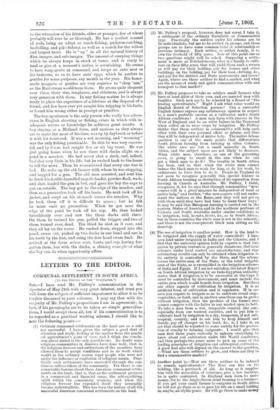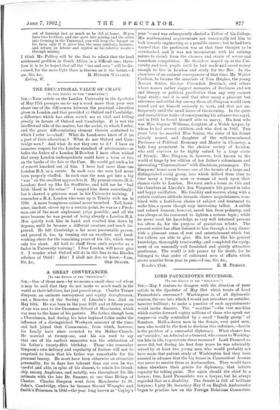LETTERS TO THE EDITOR.
COMMUNAL SETTLEMENT IN SOUTH AFRICA.
LTO TILE EDITOP. OP TUE " SPECTATOR:1
SIR,—I have read Mr. Palfrey's communication in the Spectator of May 24th with very great interest, and trust you will deem the subject of sufficient importance to allow it to be further discussed in your columns. I may say that with the majority of Mr. Palfrey's propositions I am in agreement ; in fact, if his paragraphs are to be taken as simple generalisa- tions, I would accept them all, but if his communication is to be regarded as a practical working scheme, I should like to note the following points :—
(1) Ordinary communal settlements on the land are RS a rule not successful. I have given the subject a good deal of attention and study, looking at the matter from the practi- cal agriculturist's point of view, and I think the conclu- sion above stated is the only possible one. No doubt some religious communities in America have done well ; that is, the religious fervour and enthusiasm of the members have allowed them to accept conditions and to do work which would in the ordinary course repel people who were not under the influence or exaltation of religious mania. Prac- tically such settlements have succeeded through the con- tinuous self-sacrifices of the community. Yet there is one remarkable feature about these American communal settle- ments on the land; that is, that as the settlement prospers in a commercial and financial sense, the self-sacrificing spirit within the community weakens, and when the religious fervour has expended itself they invariably become individualistic. This has been the history of all the successful American communal settlements on the land.
(2) Mr. Palfrey's proposal, however, does not cover, I take it, a settlement of the ordinary Socialistic or Communistic type. Practically the settlers under his scheme are to be individualists, but are to be settled in groups, and these groups are to have some common bond of relationship or previous intimacy. Each settler, or rather family, is to own the freehold of fifty acres. Now at this point one or two questions might well be asked. Supposing a settle- ment is made at Potchefstroom, what is a family to culti- vate on their fifty acres that will yield them such a return as will pay for their holding, pay for houses and other buildings on the holding, pay for their food, clothing, &c., and pay for the district and State assessments and taxes ? Again, where are these settlers to find a market, and what are tho means of ready and quick communication with and transport to that market?
(3) Mr. Palfrey proposes to take as settlers small farmers who have at least £200 of their own, and are married men with families. Such men are to be selected by a Board of "the
leading agriculturists." Might I ask what value would an English Board of Selection possess? Can a successful English farmer express any satisfactory opinion in respect
to a man's probable success as a cultivator under South African conditions ? A man may farm with success in the
West of England and be an utter failure in the Transvaal when called on to raise crops by irrigation. Mr. Palfrey thinks that these settlers in communities will help each other with their own personal effort or labour, and thus they will be independent of native help. The native labour question is one of the main points that differentiate South African farming from farming in other Colonies. The white race are but a small minority in South Africa, and the subject races are not likely to decrease. What white man, therefore, as one of the governing races, is going to sweat in the sun when he can get a black man to do it ? The trouble in South Africa has been, and is, that when the white man cannot induce the black man to work for him, or do his work, he endeavours to force him to do it. People in England do not seem to recognise generally this special feature in South African farming as distinctive of its separation from farming in Canada or Australia. Mr. Palfrey, I think, recognises it, for ho says that through communities "new- comers will in a great measure be independent of local or native help," and further, " the new-comers will not under- stand the natives or the Boers, and they will not get on with them until they have had time to learn their ways." It may bo said that European farming is carried out in the western States of America and in the northern portions of Victoria and South Australia under similar conditions, as to irrigation, hail, locusts, frosts, &c., as in South Africa ; but in these countries the white man is not in the minority, and there is not the ever-present black man sitting on his doorstep.
The use of irrigation is another point. How is the land to be irrigated and the supply of water controlled? I have seen land under irrigation in India and the Colonies, and I find that the universal opinion held by experts is that irri- gation by private venture is generally disastrous, that local schemes under local control are unsatisfactory, and that satisfactory results can only be obtained when irrigation in its entirety is controlled by the State, and the scheme covers the entire area of the State, or the total irrigable area of the State, as is exemplified in the irrigation schemes of India and Egypt. If I am not mistaken, the latest Report on South African irrigation by an Indo-Egyptian authority states that if irrigation is to be successful at the Cape it must be controlled by Government, and must include the entire area which would benefit from irrigation. But there are other aspects of cultivation by irrigation. It is an artificial form of cultivation and is expensive. If in one area you require to irrigate so as to cultivate cereal crops. vegetables, or fruit, and in another area these can be grown without irrigation, then the produce of the former area cannot compete with the latter in any market open to both. To take a man from a wet, temperate country like ours, especially from our western counties, and to put him to cultivate land by irrigation in a dry, temperate, if not sub- tropical, country, and to ask him to keep himself and family, pay off charges on his land, &c., is, I take it, an act that should be reported to some society for the preven- tion of cruelty to farming emigrants. I would give that man first three years radically to unlearn everything ha knew about soil cultivation under Old World conditions, and then perhaps two years more to pick up some of the leading principles of irrigation and subtropical cultivation. A good deal also will depend on the answer to the question, —What are these settlers to grow, and where are they to find a remunerative market?
Another point is,—How are these settlers to be induced to remain agriculturists ? The Boer can live on his holding, like a patriarch of old. As long as it supplies him with the necessities of existence, plus a few luxuries, he is quite contented. In England men farm to make money, for to the Anglo-Saxon mind farming is a business. If you get. your small farmer to emigrate to South Africa he will not go there so as to pass his life on a small holding in, maybe, an idyllic peace. lie will go there to make money
out of farming just as much as he did at home. If you have two brothers, and one goes into mining and the other into farming in the Transvaal, you will keep the farmer on his farm only if it gives him the same comforts, luxuries, and return on labour and capital as his relative receives through mining
I think Mr. Palfrey will be the first to admit that the laud settlement problem in South Africa is a difficult one ; there- fore it is to be hoped that all the "ins and outs" will be dis- cussed, for the more light there is thrown on it the better.—I







































 Previous page
Previous page